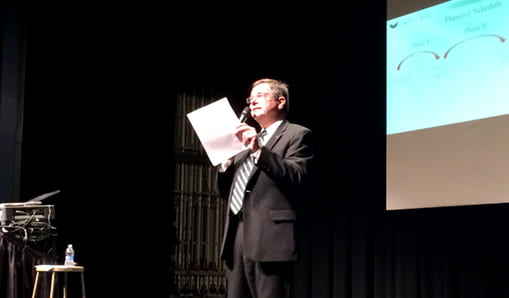
UW System Regents are hopeful a proposed $150 million annual cut will be reduced, if only by a modest amount, and they’re adamant that tenure and shared governance must remain intact, says UW-Green Bay Chancellor Gary L. Miller, reporting on the March 5 Regents meeting he attended in Madison.
At the same time, Miller told members of the campus community Friday morning (March 6), UW-Green Bay has no choice but to prepare for the worst: a cut exceeding $4 million and potential workforce and program reductions.
The chancellor addressed an audience of 200 faculty, staff members and students in the University Theatre. It was the third in a series of informational budget “town hall” updates he has convened since early February.
(Recordings of Friday’s session — the chancellor’s 30-minute opening overview, along with a separate nearly 45 minutes of question and answer — can be found online here.)
Miller briefed faculty and staff on the Regents meeting and described two resolutions passed unanimously by board members. The first reaffirmed a commitment that shared governance and faculty tenure should be preserved, regardless of the management or budget model governing UW System operations. The second asked Wisconsin legislators to reduce the size of the $150 million annual reduction proposed in the governor’s budget, and urged approval of the “public authority” model that would grant the university system additional flexibility.
During Friday’s town hall, Miller outlined for faculty and staff the accelerated timetable for UW-Green Bay identifying its options for possible reductions. He talked about entering Phase II of the process and his intent to, beginning next week, present more specific information to shared governance groups including the Faculty Senate and the campuswide University Planning and Innovation Council.
“This phase of the work will require public discussion of some very uncomfortable things,” Miller said. “This is a $4.4 million reduction… These are difficult things to talk about, but we have to do it.”
At present, Miller said, UW-Green Bay leadership has a handle on how it might address only about half of the total budget gap. Administrative divisions including University Advancement, Intercollegiate Athletics and Business and Finance have submitted reduction proposals, already approved by the Chancellor, that he characterized as “cuts to the bone that will degrade, in some cases, our ability” to operate effectively.
Major savings must also be found in academic and student support areas reporting to the Provost, a process that is proceeding more slowly because of the complexities of the challenge and relative size of the Academic Affairs area.
The chancellor volunteered examples of areas where savings could be achieved. The University will see longer replacement cycles and less-frequent upgrades in technology. The Cofrin Library and International Studies are looking at changes. Retirements in the enrollment services area could be an opportunity for reorganization. Support for campuswide grants and research services could be shifted to a new funding model. Fund 102 money that supports portions of the Adult Access and Weidner Center budgets will be reviewed, and funding of faculty/staff development activity including the Center for the Advancement of Teaching and Learning will be examined.
Within academic units, Miller said, the University is gathering data on how instructional resources are deployed. Practices related to course reassignments, workloads, overload payments, ad hoc appointments and the allocation of some academic services including student advising are being analyzed.
“What we’re really about with these is figuring out a way to work differently,” Miller said. “Not necessarily ‘more,’ but differently. In order to do that we have to examine all of these areas carefully, and we’ve been doing that for about two weeks… UPIC will be seeing some data on that very soon, to help us sort through that.”
The provost and academic deans will be asking fundamental, organizational questions, the chancellor continued. “Are there areas where we might want to be smaller… and that includes some academic programs… and, if so, how do we go about doing that, and if we do get smaller, can we reallocate to a growing area? These are hard discussions.”
He closed his presentation by thanking faculty and staff for their patience, consideration and participation in the process.
“I appreciate your courage. It’s hard to talk openly with a challenge this big. But we have to do that if we want to come through this with most of us here, with a University that can grow, and a University that can continue to be a great university.”
He urged members of the campus community to keep faith in their roles in working with students, developing future leaders and providing the community a quality institution of public higher education.
“We have to remember that this University was built on innovation, and innovation will get us through this.”
The recording of the 45-minute question-and-answer session that followed the chancellor’s remarks can be found here.

